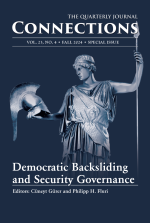This article is an analytical assessment of the trilateral relationship between Turkey, Azerbaijan, and Georgia (TAG) and seeks to account for the substantiveness of their cooperation. Using a heuristic analytical framework, it considers the role of the trilateral relationship in the foreign policies of each of the three countries and its concomitant institutional “thickness” as a mechanism for security governance, to assess TAG cooperation. Based on the analysis, the article finds that trilateral cooperation between Turkey, Azerbaijan, and Georgia can be considered substantial and indicative of alignment. However, the overarching and durable rationale for this alignment is not immediately clear. While solving the puzzle of trilateral alignment is beyond the scope of this study, the conclusion posits that TAG cooperation may be an extension of complementary strategic priorities and increasingly aligned regime types.
Reviewed article
Strategic Performance and Complementarity: A Substantiveness Analysis of Turkey-Azerbaijan-Georgia Trilateral Cooperation
Article statistics
Bibliography
Amin, Ash, and Nigel Thrift, eds., Globalization, Institutions, and Regional Development in Europe (Oxford University Press, 1995; online edn, Oxford Academic, October 2023), https://doi.org/10.1093/oso/9780198289166.001.0001.
Aras, Bülent, “The Davutoğlu Era in Turkish Foreign Policy,” Insight Turkey 11, no. 3 (Summer 2009): 127-142, https://www.insightturkey.com/articles/the-davutoglu-era-in-turkish-foreign-policy.
Aydin, Mustafa, “Foucault’s Pendulum: Turkey in Central Asia and the Caucasus,” Turkish Studies 5, no. 2 (2004): 1-22, https://doi.org/10.1080/1468384042000228576.
Babacan, Ali, “Calming the Caucasus,” The New York Times, September 23, 2008, https://www.nytimes.com/2008/09/23/opinion/23iht-edbabacan.1.16407371.html.
Balcı, Bayram, “Strengths and Constraints of Turkish Policy in the South Caucasus,” Commentary, Insight Turkey 16, no. 2 (2014): 43-52, 43, https://www.insightturkey.com/author/bayram-balci/the-ak-party-dominant-party-new-turkey-and-polarization-1.
Bozkurt, Abdullah, “Turkey, Georgia and Azerbaijan to Boost Cooperation in Military, Defense,” Nordic Monitor, June 17, 2019, https://www.nordicmonitor.com/2019/06/turkey-georgia-and-azerbaijan-to-boost-cooperation-in-military-defense/.
Cecire, Michael H., “Russian Hegemony Begets Georgian Discontents: Tbilisi’s Search for Strategic Ballast,” Russian Analytical Digest (RAD) no. 232, February 22, 2019, https://doi.org/10.3929/ethz-b-000328891.
Cecire, Michael H., “The Bilateral Origins of South Caucasus Trilateralism,” in Turkish-Azerbaijani Relations: One Nation—Two States? ed. Murad Ismayilov and Norman A. Graham (Routledge, 2016), 84-99, https://doi.org/10.4324/9781315625119-4.
Cecire, Michael Hikari, “Georgia’s Alliance With – Not In – NATO: External Balancing, Autonomy and Community,” in Georgia’s Foreign Policy in the 21st Century: Challenges for a Small State, ed. Tracey German, Stephen F. Jones, and Kornely Kakachia (London: I.B. Tauris, 2022): 179-194, https://doi.org/10.5040/9780755645350.ch-9.
Cecire, Michael, “Georgia’s 2012 Elections and Lessons for Democracy Promotion,” Orbis 57, no. 2 (Spring 2013): 232-250, https://doi.org/10.1016/j.orbis.2013.02.003.
Çınar, Menderes, “Turkey’s ‘Western’ or ‘Muslim’ Identity and the AKP’s Civilizational Discourse,” Turkish Studies 19, no. 2 (2018): 176-197, https://doi.org/10.1080/14683849.2017.1411199.
Glebov, Sergii, “Black Sea Security as a Regional Concern for the Black Sea States and the Global Powers,” Southeast European and Black Sea Studies 9, no. 3 (2009): 351-365, https://doi.org/10.1080/14683850902934341.
Gurbanov, Ilgar, “Azerbaijan’s Trilateral and Bilateral Military Cooperation with Turkey and Georgia: Important for Azerbaijan’s Security Calculations,” in Panorama of Global Security Environment: The Central European Perspective – 2017-2018, ed. Róbert Ondrejcsák et al. (Bratislava, Slovakia: Stratpol, 2018), 251-269, https://www.academia.edu/40151655/.
Inan, Feride, and Diana Yayloyan, “New Economic Corridors in the South Caucasus and the Chinese One Belt One Road” (Economic Policy Research Foundation of Turkey, 2018), https://epfarmenia.am/wp-content/uploads/2018/04/New_Economic_Corridors_in_the_South_Caucasus_and_the_Chinese_One_Belt_One_Road_2018.pdf.
Ismayilov, Murad, “Azerbaijan’s Russia Conundrum: Towards the Rise of an Unlikely Alliance,” Russian Politics 4, no. 2 (2019): 242-267, https://doi.org/10.1163/2451-8921-00402005.
Köstem, Seçkin, “Geopolitics, Identity and Beyond: Turkey’s Renewed Interest in the Caucasus and Central Asia,” in Turkey’s Pivot to Eurasia: Geopolitics and Foreign Policy in a Changing World Order, ed. Emre Erşen and Seçkin Köstem (London: Routledge, 2019), https://doi.org/10.4324/9780429023064.
Kuchins, Andrew C., Jeffrey Mankoff, and Oliver Backes, Georgia in a Reconnecting Eurasia: Foreign Economic and Security Interests (Center for Strategic & International Studies and Rowman & Littlefield, 2016), https://csis-website-prod.s3.amazonaws.com/s3fs-public/publication/160429_Kuchins_GeorgiaReconnectingEurasia_Web.pdf.
Kyle, Joe, “Perspectives Roadblocks: Georgia’s Long Road to NATO Membership,” Demokratizatsiya: The Journal of Post-Soviet Democratization 27, no. 2 (Spring 2019): 237-247, https://muse.jhu.edu/article/721877.
Lander, Stephen, “International Intelligence Cooperation: An inside Perspective,” Cambridge Review of International Affairs 17, no. 3 (2004): 481-493, https://doi.org/10.1080/0955757042000296964.
Larrabee, F. Stephen, “The United States and Security in the Black Sea Region,” Southeast European and Black Sea Studies 9, no. 3 (2009): 301-315, http://doi.org/10.1080/14683850902934309.
Lianlei, Bai, “Azerbaijan in the Silk Road Economic Belt: A Chinese Perspective,” China Institute of International Studies (CIIS), August 2016.
Manoli, Panagiota, The Dynamics of Black Sea Subregionalism (London: Routledge, 2012, eBook Published 2016), https://doi.org/10.4324/9781315615738.
Murinson, Alexander, “The Strategic Depth Doctrine of Turkish Foreign Policy,” Middle Eastern Studies 42, no. 6 (2006): 945-964, https://doi.org/10.1080/00263200600923526.
Nilsson, Martin, and Daniel Silander, “Democracy and Security in the EU’s Eastern Neighborhood? Assessing the ENP in Georgia, Moldova, and Ukraine,” Democracy and Security 12, no. 1 (2016): 44-61, https://doi.org/10.1080/17419166.2015.11357441.
Oskanian, Kevork, “The Balance Strikes Back: Power, Perceptions, and Ideology in Georgian Foreign Policy, 1992–2014,” Foreign Policy Analysis 12, no. 4 (2016): 628-652, https://doi.org/10.1093/fpa/orw010.
Ozkan, Behlül, “Turkey, Davutoglu and the Idea of Pan-Islamism,” Survival 56, no. 4 (2014): 119-140, https://doi.org/10.1080/00396338.2014.941570.
Saraçoğlu, Cenk, and Özhan Demirkol, “Nationalism and Foreign Policy Discourse in Turkey Under the AKP Rule: Geography, History and National Identity,” British Journal of Middle Eastern Studies 42, no. 3 (2014): 301-319, https://doi.org/10.1080/13530194.2014.947152.
Shiriyev, Zaur, “Institutionalizing a Trilateral Strategic Partnership: Azerbaijan, Georgia, Turkey,” Policy Paper (Tbilisi, Georgia: Konrad-Adenauer-Stiftung, 2016), http://www.kas.de/wf/doc/kas_43884-1522-1-30.pdf.
Stein, Aaron, Turkey’s New Foreign Policy: Davutoglu, the AKP and the Pursuit of Regional Order (London: Routledge, 2015).
Strakes, Jason E., “Situating the ‘Balanced Foreign Policy’: The Role of System Structure in Azerbaijan’s Multi-Vector Diplomacy,” Journal of Balkan and Near Eastern Studies 15, no. 1 (2013): 37-67, https://doi.org/10.1080/19448953.2013.766085.
Tassinari, Fabrizio, “A Synergy for Black Sea Regional Cooperation: Guidelines for an EU Initiative,” CEPS Policy Brief no. 105, Centre for European Policy Studies, June 2006, https://www.ceps.eu/ceps-publications/synergy-black-sea-regional-cooperation-guidelines-eu-initiative/.
Valiyev, Javid, “Foreign Policy of Azerbaijan in 25 Years of Independence: Priorities, Principles and Achievements,” Caucasus International 7, no. 1 (Summer 2017): 29-46.
Vladova, Galya, and Jörg Knieling, “Potential and Challenges for the Black Sea Regional Cooperation,” Eastern Journal of European Studies 5, no. 1 (2014): 39-66, https://ejes.uaic.ro/articles/EJES2014_0501_VLA.pdf.
Yilmaz, Ihsan, and Galib Bashirov, “The AKP after 15 Years: Emergence of Erdoganism in Turkey,” Third World Quarterly 39, no. 9 (2018): 1812-1830, https://doi.org/10.1080/01436597.2018.1447371.

